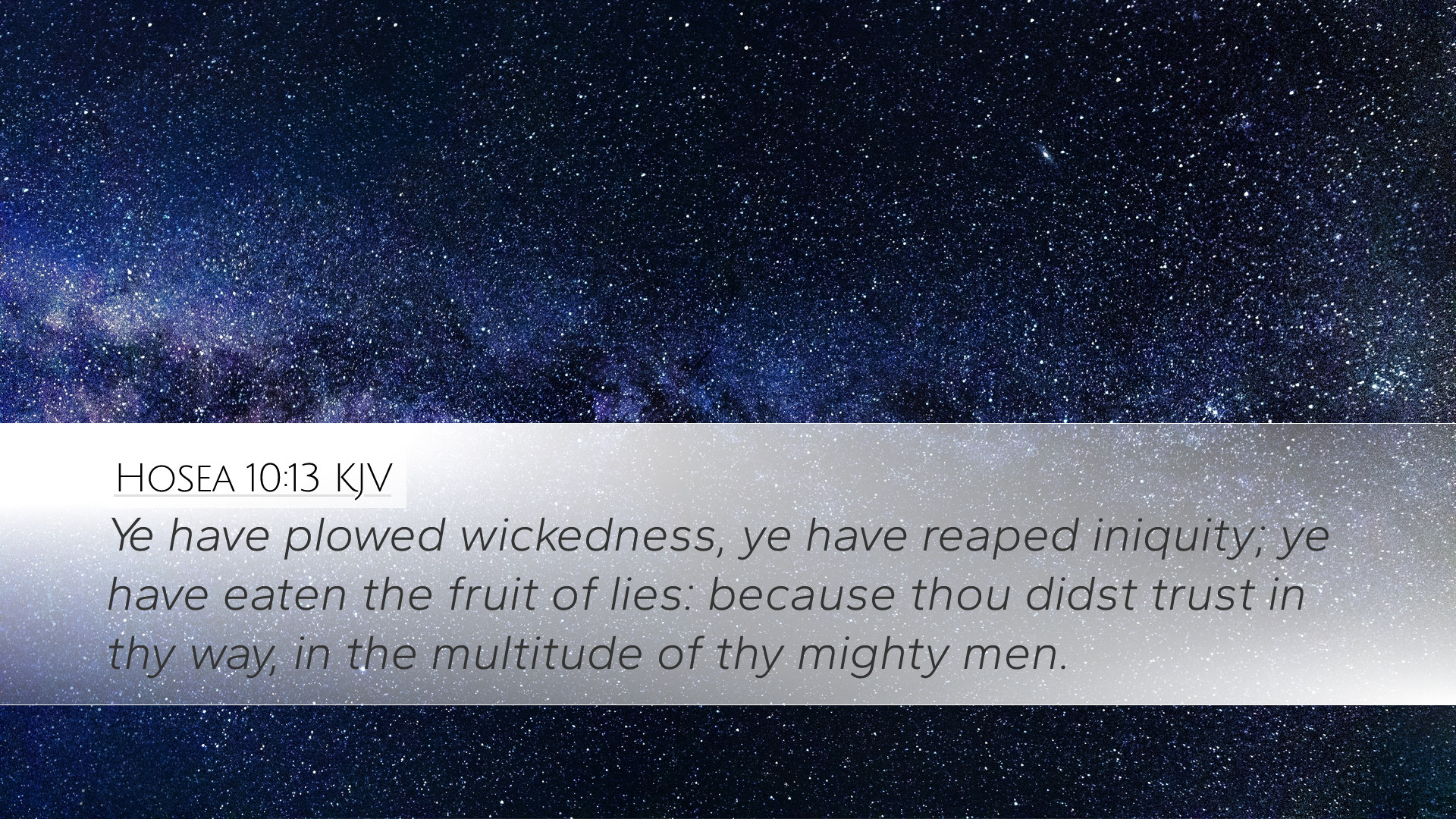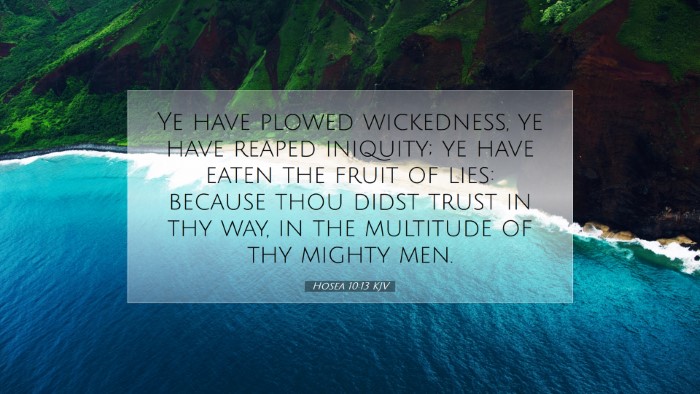Old Testament
Genesis Exodus Leviticus Numbers Deuteronomy Joshua Judges Ruth 1 Samuel 2 Samuel 1 Kings 2 Kings 1 Chronicles 2 Chronicles Ezra Nehemiah Esther Job Psalms Proverbs Ecclesiastes Song of Solomon Isaiah Jeremiah Lamentations Ezekiel Daniel Hosea Joel Amos Obadiah Jonah Micah Nahum Habakkuk Zephaniah Haggai Zechariah MalachiHosea 10:13
Hosea 10:13 KJV
Ye have plowed wickedness, ye have reaped iniquity; ye have eaten the fruit of lies: because thou didst trust in thy way, in the multitude of thy mighty men.
Hosea 10:13 Bible Commentary
Bible Commentary on Hosea 10:13
Hosea 10:13 states, "You have plowed wickedness; you have reaped iniquity; you have eaten the fruit of lies: because you did trust in your way, in the multitude of your mighty men." This verse encapsulates the central themes of sin, judgment, and the consequences of reliance on human strength over divine providence.
Contextual Analysis
The Book of Hosea addresses the spiritual unfaithfulness of Israel, who is depicted as an adulterous wife. Hosea's prophetic ministry occurred during a time of great societal turmoil and moral decline, specifically in the Northern Kingdom of Israel, where idolatry and corruption thrived.
Exegesis of Hosea 10:13
- "You have plowed wickedness;" - This metaphor illustrates the actions of Israel, suggesting that they engaged in iniquitous behaviors as consistently as a farmer plows his fields.
- "you have reaped iniquity;" - This phrase points to the inevitable consequence of their actions. Just as sowing leads to a harvest, so too does wickedness lead to iniquity as its fruit.
- "you have eaten the fruit of lies;" - This line emphasizes the deceptive nature of sin, indicating that the populace in Israel was consuming falsehoods, which nourished their iniquitous lifestyle.
- "because you did trust in your way, in the multitude of your mighty men;" - Here, Hosea identifies the root of their sin—trusting in human strength and military might rather than in the Lord.
Theological Implications
The impassioned message of Hosea 10:13 resonates through several theological avenues:
- Human Depravity: This verse underscores the doctrine of sinfulness inherent in humanity. The Israelites sowed wickedness and reaped iniquity; thus, it is evident that sin leads to a cycle of destruction.
- Trust in God vs. Trust in Man: The passage starkly contrasts reliance on God's strength versus human endeavors, emphasizing the futility of trusting in militaristic prowess or personal capabilities.
- The Consequences of Idolatry: The reference to the "fruit of lies" conveys the idea that idolatry not only leads to a departure from God but also perpetuates a lifestyle built on falsehoods, which ultimately bears judgment.
Insights from Public Domain Commentaries
Matthew Henry's Commentary
Matthew Henry interprets this passage as a stark warning to those who indulge in wickedness. He remarks that their actions are akin to agricultural practices where evil is sown and subsequently harvested as iniquity. He explains that the "fruit of lies" signifies the deceitful practices that Israel engaged in and how this deception led to their downfall, illustrating that they brought turmoil upon themselves.
Albert Barnes' Notes on the Bible
Albert Barnes takes a historical approach, elucidating that the Israelites trusted in their own might rather than turning to God. He draws attention to the notion that the Israelite reliance on their army demonstrates a lack of dependence on divine power. Barnes emphasizes that the penalty for this hubris is often severe, as it breeds not only personal but national calamity.
Adam Clarke's Commentary
Adam Clarke elaborates on the metaphor of reaping and sowing, explaining that it reflects a spiritual principle woven throughout scripture. He assesses that the concept of eating "the fruit of lies" serves as a profound warning regarding deceptive influences in society and the adverse spiritual consequences that follow. Clarke also reflects on God's righteousness in allowing such consequences to fall upon those who abandon their covenant with Him.
Reflection and Application
Reflecting on Hosea 10:13, it is essential for pastors, theologians, and scholars to discern the implications of trust within a contemporary context. The current societal reliance on human wisdom and strength mirrors the situation faced by the Israelites.
Practical Applications
- Self-Examination: Individuals should critically evaluate whether their trust lies in God or in human systems and structures.
- Preaching Righteousness: Pastors can use this verse to promote messages that highlight the necessity of a righteous life in alignment with divine principles.
- Encouraging Spiritual Dependence: Emphasizing the importance of spiritual dependence on God rather than on personal strength or societal systems is crucial.
Conclusion
Hosea 10:13 serves as a profound reminder of the permanent truths about the consequences of sin and human reliance. The verse reiterates the necessity for believers to trust wholly in God's provision and guidance. The insights drawn from early commentaries, alongside a contemporary application, serve to exhort believers to reflect on their standing with God, encouraging a return to authentic faith and trustworthy obedience.


